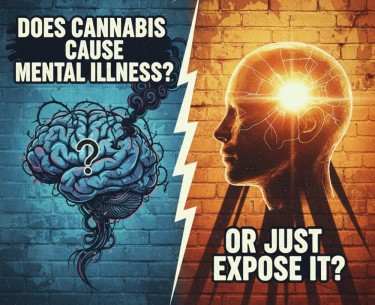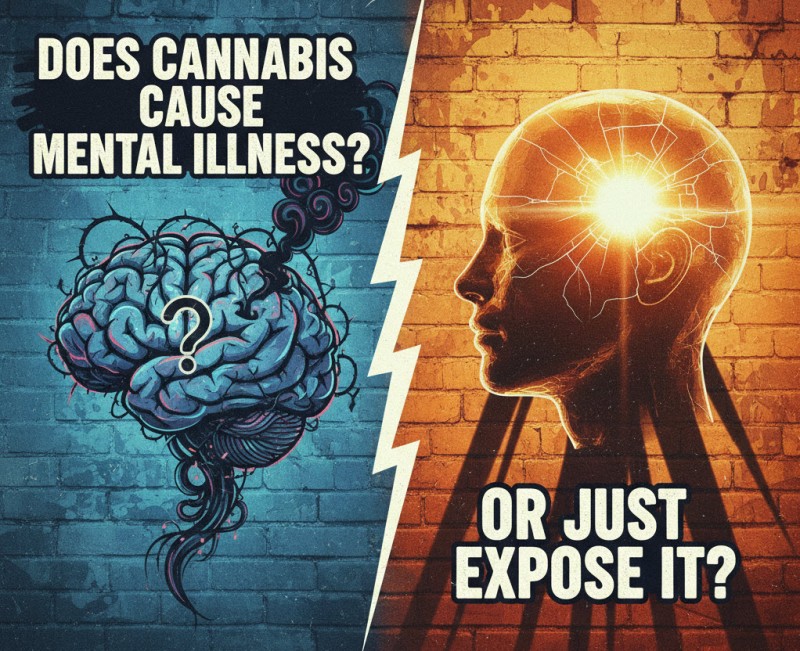
Despite the numerous studies backing up the significant mental and physical benefits of marijuana, prohibitionists still continue to fuel the fear-mongering factory with clickbaity articles and content, which claim that cannabis causes mental illness.
Weed causes psychosis and schizophrenia, they claim.
If it sounds familiar, that’s because the rhetoric is similar to those used during the War on Drugs. After all, it’s well-known that fear is a powerful tool; policymakers abused fear-based messaging during the War on Drugs to control people’s behaviors. They did not make use of nuanced discussions when it came to the effects of marijuana on people’s brains; instead, campaigns such as Reefer Madness, or This Is Your Brain On Drugs, which were designed to cause moral panic.
But when we look deeper, we can tell that there is a clear distinction that readers must make: it’s much more likely that cannabis exposed a mental illness that was already there in the first place. It was just dormant.
Questionable Causation Despite Strong Associations
We truly can’t believe everything we read or see. Using critical thinking, we can determine that correlation does not translate to causation. It’s true that cannabis use, especially high THC strains, can help uncover symptoms of mental illnesses, especially psychosis or schizophrenia, but that’s because the individual was already predisposed to it or had it. That does not mean that weed outright causes the illness.
Many of the viral studies that come out claim that smoking marijuana was linked to cases of psychosis or schizophrenia. For example, this study claims that marijuana users had a higher incidence of developing psychotic disorders compared to non-users. However, we have to remember that associations aren’t equivalent to causation; just because there is a link doesn’t mean that weed itself caused the mental illness or the symptoms. There is a good likelihood that other factors were involved: environment, genetics, trauma, stress, and biology, to name a few.
The Role of Predisposition
Individuals with a genetic risk, such as those who have a family history of mental illnesses including schizophrenia, are much more likely to exhibit symptoms if they consume weed. The chances that cannabis use would expose the symptoms of a mental health condition are significantly higher if the individual uses cannabis early in life, or before the age of 18.
If we can look deeper, we’ll find that there are studies mentioning childhood trauma and adversity. As an example, exposure to childhood abuse or discord at home can later on lead to cannabis use as well as psychosis, which is discussed in this study.
It’s important to keep in mind that marijuana doesn’t impact everyone’s brains the same way. There are people who are psychologically or biologically primed to respond in a certain way; most people don’t experience dramatic side effects when they smoke weed, while it can make others face a serious mental health problem due to their childhood.
The correct way to explain it is that, instead of saying cannabis uses causes psychosis, cannabis likely already interacts with existing risk factors.
Other Factors: Age, Potency
Not all marijuana use has the same kind of risk even to individuals who are already predisposed to mental illnesses. What also matters is how strong your weed is, and how early you start using it.
The potency of weed has been rising dramatically over the past few decades. During the early 1990s, strains with a THC content of around 4% was common while it eventually rose to 15% and up in the late 2000s. That doesn’t even include concentrates, which can easily contain anywhere from 60 to 80% THC - that’s enough to knock out even the most seasoned consumers.
This matters because THC is the cannabinoid responsible for producing the high in weed. It also happens to be the compound blamed for symptoms of psychosis, such as paranoia, hallucinations, and delusions especially in high doses. Individuals who are predisposed yet consume high doses of THC are much more likely to exhibit symptoms of severe mental illness compared to non-users or consumers who take less THC.
Additionally, data tells us that the human brain continues developing until we reach 25 years old. There is a reason why there are laws against allowing kids under the age of 21 to consume substances, because those substances can and will interfere with parts of the brain responsible for decision making and emotional regulation.
Early onset cannabis users have been shown to suffer from long-lasting emotional and cognitive effects. They are also more prone to mental illnesses later on in life, including anxiety and psychosis among others.
To summarize, all these factors play an important role: consuming high THC marijuana will increase the chances of developing psychosis or paranoia, and the effects of consuming it frequently will compound over time. Your brain will also be more vulnerable the younger you start.
CONCLUSION
At the end of the day, weed isn’t the villain here. Cannabis is a powerful medicinal plant that interacts with the human body’s cannabinoid system, which is complex. Nothing is every just one-sided; there are several nuances to consider and it’s critical that we continue educating ourselves because cannabis deserves respect and education.
The bottom line is that weed doesn’t cause mental illness: it amplifies or exposes existing vulnerabilities in individuals who are already predisposed. It’s so important to make the distinction here because cannabis isn’t and never was the issue, but more like how it’s used and who uses it.







